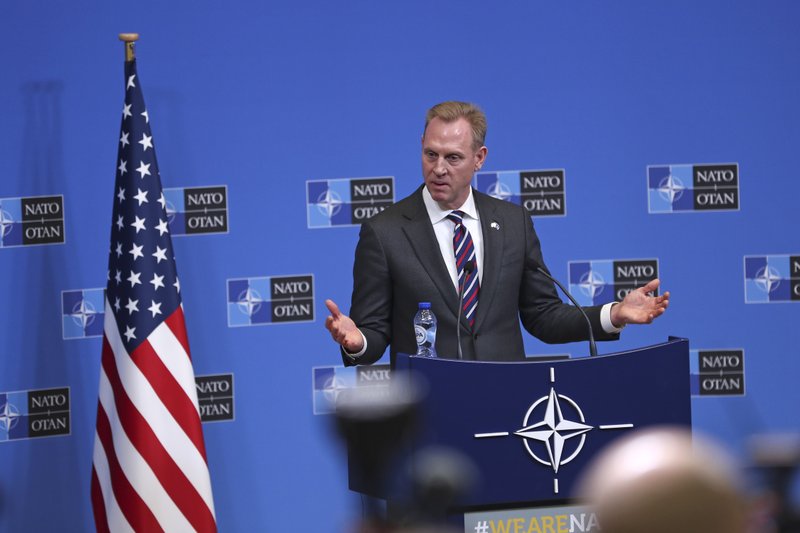BRUSSELS -- The United States will not reduce its troop presence in Afghanistan unilaterally, the top Pentagon official said Thursday, pledging that any moves will be fully coordinated with its allies.
"There will be no unilateral troop reductions," acting Defense Secretary Patrick Shanahan told reporters after his first meeting with NATO defense chiefs. "That was one of the messages: It will be coordinated. We're together."
President Donald Trump has said he wants out of Afghanistan, raising doubts about NATO's Afghan troop training operation in the strife-torn country. About 14,000 U.S. troops are deployed there, just over half with NATO and the rest doing counterterror and combat operations.
Shanahan made clear that if U.S. troop cuts are made, either in connection with peace negotiations with the Taliban or in other circumstances, Washington will consult with NATO to ensure coordination.
"What we talked about was, how do we double down on support for Afghan national defense and security forces to put even more pressure on the Taliban," Shanahan said.
Were U.S. troops to leave the NATO operation, countries like Germany and many smaller allies wouldn't be able to do their jobs because they rely on American air support.
NATO's top military officer, U.S. Gen. Curtis Scaparrotti, said he has not been asked to plan for any drawdown.
"I don't have the direction to do it, or the guidance to do it, or the decision to drive it," he told reporters.
The U.S. and NATO troops are mostly advising and training, but when requested they assist Afghan forces in battles with the Taliban, who carry out near-daily assaults on Afghan soldiers and police. More than 17 years after they were ousted by a U.S.-led coalition, the Taliban control, influence or hold sway over nearly half the country, and the conflict is at a stalemate.
NATO is wary of setting any timeline for a possible withdrawal as the Taliban have been content to wait out international forces in the past.
Still, NATO knows that the Taliban want foreign forces off Afghan soil and that its possible departure could be a powerful bargaining chip in any peace talks. NATO, though, would not leave empty-handed. It would want guarantees that the Taliban will live up to any promises in those talks, and perhaps would even want to stay to monitor the peace moves.
U.S. envoy Zalmay Khalilzad has been meeting with the Taliban and others to try to end the conflict, and the results of those talks could help determine the future of NATO's mission. However, the Afghan government is not yet involved in the political moves to set up peace talks.
Meanwhile, a surprise announcement by Afghan Taliban leaders that they are sending a delegation to Pakistan early next week to meet with American negotiators and Pakistani officials was met with a cautious U.S. denial Thursday and silence from Pakistan.
If such a visit does take place Monday, it would upstage the formal resumption of ongoing U.S.-Taliban meetings on Feb. 25 in Qatar and represent the first time the Afghan insurgents have openly met with Pakistani leaders since their five-year regime in Kabul was overthrown in 2001.
Whether the announcement was merely a trial balloon in the increasingly complex and expanding Afghan peace process, or the result of private agreements that will eventually be acknowledged, it appeared to bolster Pakistan's recent claims under Prime Minister Imran Khan that it wants to play a constructive role in ending the Afghan conflict now in its 18th year.
The Afghan Taliban spokesman, Zabiullah Mujahid, said in a statement posted online late Wednesday that the group's plan to visit Pakistan stemmed from a "formal invitation" from the Islamabad government, and that its delegates would meet with the Pakistan premier.
A spokesman for the U.S. Embassy in Pakistan said the Taliban announcement had been "noted" but that "we have not received a formal invitation to any talks ... we are not going to negotiate in public." It also said the U.S. government "supports all steps" that would lead to inclusive peace talks and encourages "all countries" to support the process.
As of Thursday, there have been no public comments or statements about the possible Taliban visit from Pakistan's Foreign Ministry or other senior government offices.
Information for this article was contributed by Lorne Cook and Robert Burns of The Associated Press; and by Pamela Constable of The Washington Post.
A Section on 02/15/2019

